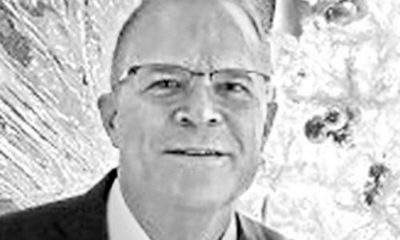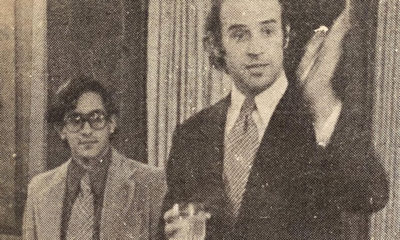Politics
Religious exemption inspires heated debate at ENDA panel
Wolfson challenges current language in LGBT anti-discrimation bill
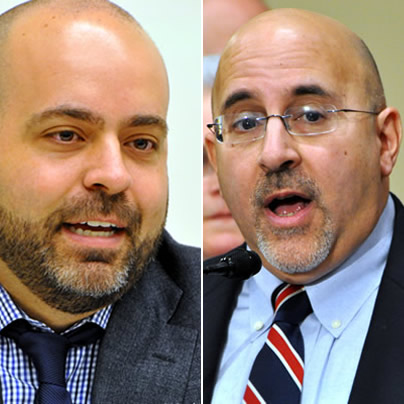
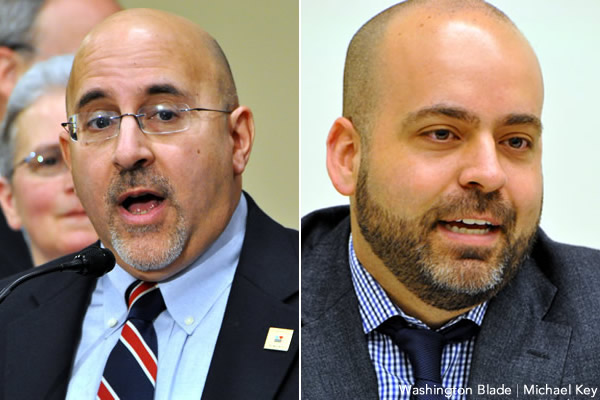
Freedom to Marry’s Evan Wolfson (left) and Freedom to Work’s Tico Almeida had heated exchange on ENDA’s religious exemption (Blade file photos by Michael Key).
NEW YORK — The appropriate scope of the religious exemption in the Employment Non-Discrimination Act continues to stir debate as a prominent marriage equality advocate on Thursday made a surprise endorsement of narrowing the broad provision in the bill.
Evan Wolfson, president of Freedom to Marry, said he shares the “grave concerns” expressed by the American Civil Liberties Union over the religious exemption — which he said would “carve coverage by certain kinds of entities for LGBT people” — during a panel as part of Freedom to Work’s premier “Situation Room” in New York City.
“I do have grave concerns about the specific language in the specific bill,” Wolfson said. “That’s one of the points of difference I have with Freedom to Work on this current bill.”
Currently, ENDA has a religious exemption that provides leeway for religious organizations, like churches or religious schools, to discriminate against LGBT employees. That same leeway isn’t found under Title VII, which prohibits religious organizations from discriminating on the basis of race, gender or national origin.
Wolfson and Tico Almeida, president of Freedom to Work and proponent of the religious exemption, were the lone speakers on the second panel of the day. Wolfson’s main purpose on the panel was to talk about the lessons the campaign to pass ENDA can learn from the marriage equality fight.
Almeida initially responded by saying the religious exemption has value in allaying concerns from Republican lawmakers who are undecided on ENDA.
“I would say that in a bunch of Republican meetings we spend a majority of the time talking about the religious exemption and exactly how it will apply, what the case law is,” Almeida said.
Almeida co-wrote the current version of the religious exemption when working as a staffer for Rep. George Miller (D-Calif.). It was passed as an amendment on the U.S. House floor in 2007 to a gay-only version of ENDA by a vote of 402-25.
But Almeida qualified his support for the religious exemption by saying he believes religious organizations shouldn’t be able to receive federal funds if they discriminate against LGBT people. But, Almeida continued, the mechanism to prohibit this discrimination isn’t ENDA; rather, it should be a workplace non-discrimination executive order signed by President Obama.
“I think there’s complete uniformity that we are all pushing for a federal policy that if you take and profit from federal dollars, you must follow American values, you must pledge not to discriminate against LGBT folks — and if you get caught, there should be consequences,” Almeida said.
But Wolfson quickly retorted as the panel developed into a heated debate between him and Almeida that seemed to become almost hostile as the session closed.
“We have a body of laws across the country that include sexual orientation and gender identity as prohibited discriminatory classifications alongside race, sex and others — and they have all followed generally a certain kind of exemption — as had Title VII and the Civil Rights Act, and so on,” Wolfson said. “The problem with this current draft of ENDA is that exemption goes far beyond what that body of experience has taught us is the right balance.”
Wolfson added the argument in favor of ENDA to undecided lawmakers should be to look at existing law throughout the states as opposed to enshrining “new and unnecessary and dangerous exemptions from non-discrimination law.”
“By the way, calling them religious exemptions implies that there’s some religious problem to be solved,” Wolfson said. “There is no religious problem to be solved: what these are are licenses to discriminate.”
Almeida, a Catholic, responded by saying he thinks attitudes should change within the church by action from members of that particular faith.
“I don’t believe civil rights statute in the form of Title VII and ENDA should be used to force the Catholic Church to make a change to its policies,” Almeida said. “I think we will push them, and it may take decades, and it may take more than my lifetime, but we will push them in other ways.”
Almeida added he doesn’t understand the argument the religious exemption in ENDA is a new approach because he said he “literally copied and pasted it from Title VII.”
Besides, Almeida also said groups that oppose ENDA’s religious exemption missed an opportunity to propose an amendment when the Senate Health, Education, Labor & Pensions Committee voted on the bill in July. Also, he challenged them to make public the language they would prefer instead.
“I would love for those organizations to publicly communicate to the LGBT community and to Congress what is their proposal,” Almeida said. “They made a big fuss …, and they didn’t seek an amendment at markup. They didn’t ask any of our progressive champions, and there are very progressive champions on that committee, or if they asked, then they got rejected.”
Wolfson countered by saying Almeida’s proposal to change the Catholic Church from within is “completely irrelevant” to the conversation of putting a “license to discriminate” in a statute.
“Nobody is saying that the Catholic Church should be sued or told what to do as a matter of law when it comes to doctrine or the church, or ministers,” Wolfson said. “That’s misleading language that might confuse people in a way that you didn’t intend.”
Additionally, Wolfson said Almeida was mischaracterizing the religious exemption in ENDA by saying it’s lifted from Title VII. Almeida conceded that point on the panel.
“To say that something has some degree of religion in it, but now that it’s in the marketplace, it can now fire not just the priest, but the janitor, that’s an exemption that doesn’t exist in Title VII or any other parts of law,” Wolfson said.
Concluding his argument, Wolfson said the religious exemption issue must be resolved because it’s giving fuel to the anti-LGBT forces seeking to thwart ENDA passage.
“The religious exemption language thing is mostly a distraction, it’s a non-and-wrong solution to a non-problem, but becomes important if it get put into law,” Wolfson said.
Ian Thompson, legislative representative for the ACLU, told the Blade after the panel he commends Wolfson for endorsing a narrower religious exemption for ENDA, calling the news “a great development.”
“As a leader of the freedom to marry movement, he knows as well as anyone the importance of rejecting overly broad religious exemptions,” Thompson said.
Further, Thompson responded to Almeida’s claims that narrower language on religious institutions hasn’t been proposed by pointing to existing law.
“The alternative to ENDA’s unprecedented religious exemption has been and remains crystal clear,” Thompson said. “Just as our civil rights laws have never permitted blank checks to discriminate based on race, sex, national origin, age, and disability, they must not now do so based on sexual orientation and gender identity.”
Discussion of the religious exemption also came up during the first panel of the day, which consisted of six speakers from a bipartisan group of LGBT organizations. Paul Schindler, editor-in-chief of Gay City News, asked the panel if they were comfortable with the language.
Gregory Angelo, executive director of the National Log Cabin Republicans, started off the discussion by saying he was “comfortable” with the current wording because it’s hard enough selling the bill as it is.
“Without naming names, there are meetings that I have had with Republicans — both in the House and the Senate — where there’s some Republicans who don’t feel those religious protections go far enough,” Angelo said. “We’re pushing back against that. I think the protections as they exist now are strong, they’re solid.”
Melissa Sklarz, a transgender Democratic activist from Stonewall Democrats of New York City, seemed to support the exemption on a temporary basis as a way to win support for the bill, saying it won’t hold up in court and is just “a barrier to try to win allies” on the Republican side.
“It’s a good idea,” Sklarz said. “We watched them fight LGBT equality in ‘Don’t Ask, Don’t Tell’ and we’ve watched it in marriage. As they keep throwing things at ideas that prevent equality, they will not stand up. If this is going to win allies among the moderate and right-wing so we can get it to the floor, then great.”
Asked by Schindler whether under the current religious exemption he could be fired at a Catholic hospital or a Mormon book store, Almeida replied, “It depends.”
“It depends on the facts,” Almeida said. “Law has very few bright line tests, and neither the Title VII religious exemption, nor the ENDA religious exemption, list types of organizations. So, courts have created factors that are considered.”
Almeida said courts have established that for-profit businesses are eligible for the religious exemption under existing law. But he acknowledged that organizations like the Catholic Church and Catholic Charities will be able to continue to discriminate against LGBT people in hiring and firing decisions.
“By tying the ENDA religious exemption explicitly to the Title VII religious exemption, that gives us the most clarity, and as a byproduct, and for me it’s just a byproduct, it’s going to be the one to help us win,” Almeida said.
Politics
HRC slams White House over position opposing gender affirming surgeries for minors
‘Biden administration is flat wrong on this’
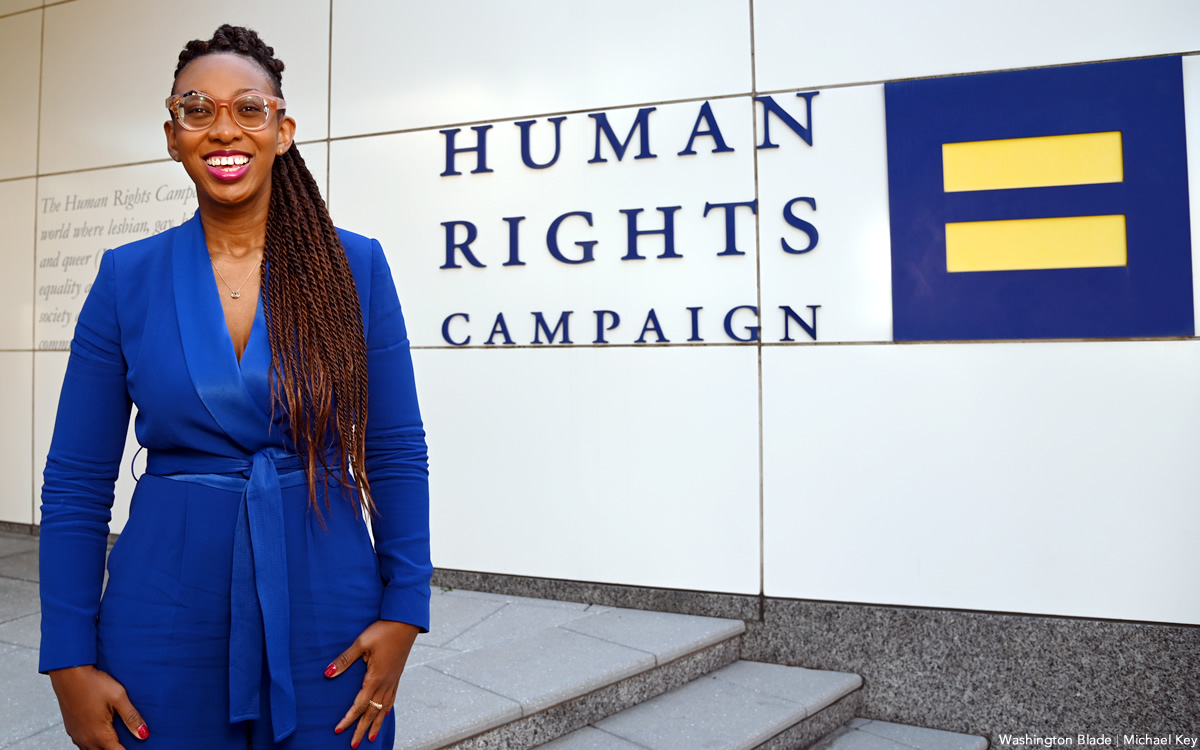
Human Rights Campaign President Kelley Robinson issued a strong rebuke on Tuesday of the Biden-Harris administration’s position opposing gender affirming surgeries for minors.
The New York Times reported on June 28 that the White House, which broadly supports making medical interventions available for transgender youth, had expressed opposition to surgeries for patients under 18, having previously declined to take a specific position on the question.
“Health care decisions for young people belong between a patient, their family, and their health care provider. Trans youth are no exception,” Robinson responded.
“The Biden administration is flat wrong on this. It’s wrong on the science and wrong on the substance. It’s also inconsistent with other steps the administration has taken to support transgender youth. The Biden administration, and every elected official, need to leave these decisions to families, doctors and patients—where they belong,” she added. “Although transgender young people make up an extremely small percentage of youth in this country, the care they receive is based on decades of clinical research and is backed by every major medical association in the U.S. representing over 1.3 million doctors.”
Robinson said the “administration has committed to fight any ban on healthcare for transgender youth and must continue this without hesitation—the entire community is watching.”
“No parent should ever be put in the position where they and their doctor agree on one course of action, supported by the overwhelming majority of medical experts, but the government forbids it,” she added.
HRC is a prominent backer of Biden’s 2024 reelection campaign, having pledged $15 million to support efforts in six battleground states. The organization has a strong relationship with the White House, with the president and first lady headlining last year’s National Dinner.
A White House spokesperson declined to respond to Robinson’s statement.
Campaign for Southern Equality President Allison Scott also issued a statement.
“This is a cowardly statement from an administration that promised to support transgender people. It is a troubling concession to the right-wing assault on transgender Americans, falling for their false narratives about surgical care and betraying a commitment to equality and trust in the medical community,” said Scott.
“Let’s be very, very clear: Government has no business inserting itself into private medical decisions that should be exclusively between patients, their providers, and the patients’ parent or guardian,” Scott added.
“It is dangerous to begin endorsing categorical bans or limits on healthcare, and there is no justification for restricting transgender youth’s access to the very same care that many cisgender youth receive every year — that’s literally the definition of discrimination,” Scott concluded. “We demand the Biden administration retract this thoughtless statement and work to undo its damage.”
Congress
Members of Congress introduce resolution to condemn Uganda’s Anti-Homosexuality Act
U.S. Reps. Mark Takano (D-Calif.) and Joyce Beatty spearheaded condemnation
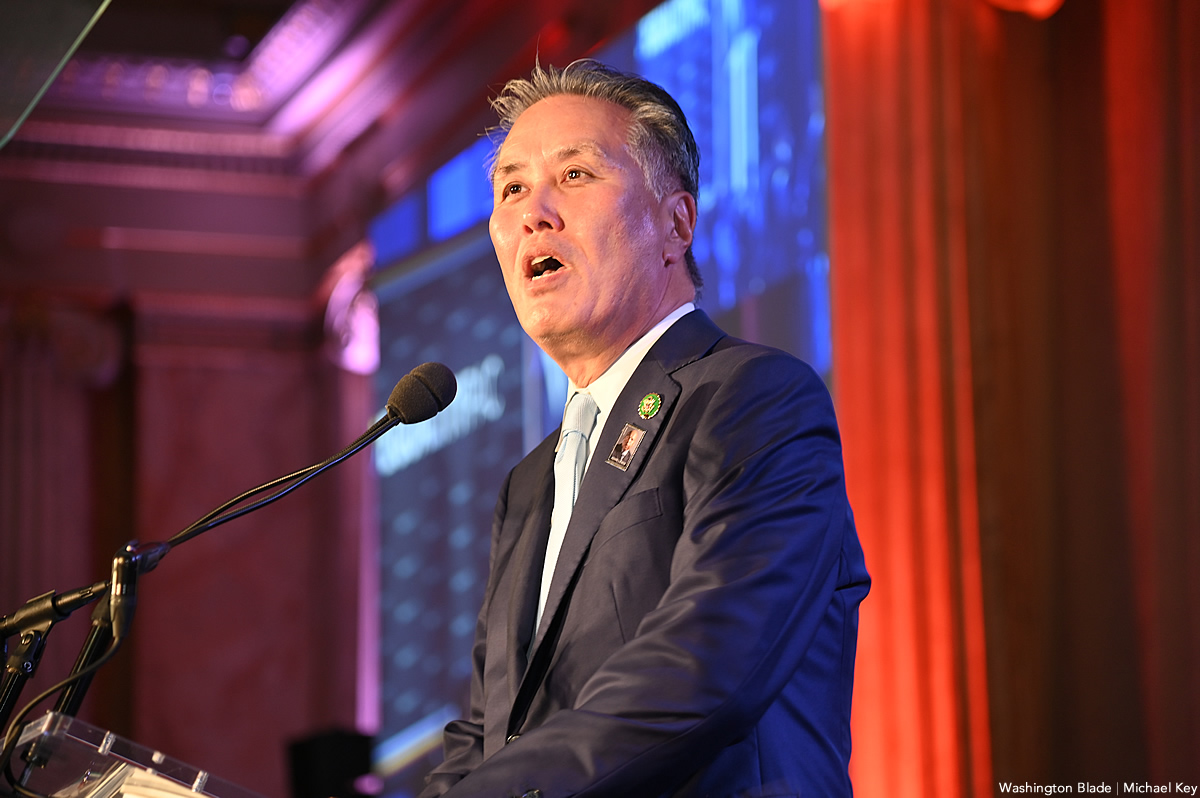
More than 20 members of Congress on Thursday introduced a resolution that condemns Uganda’s Anti-Homosexuality Act.
Gay California Congressman Mark Takano and U.S. Rep. Joyce Beatty (D-Ohio) spearheaded the resolution that U.S. Reps. Becca Balint (D-Vt.), Lloyd Doggett (D-Texas), Adriano Espaillat (D-N.Y.), Robert Garcia (D-Calif.), Sylvia Garcia (D-Texas), Josh Gottheimer (D-N.J.), Raúl Grijalva (D-Ariz.), Pramila Jayapal (D-Wash.), Hank Johnson (D-Ga.), Gwen Moore (D-Wis.), Seth Moulton (D-Mass.), Jerry Nadler (D-N.Y.), Eleanor Holmes Norton (D-D.C.), Mark Pocan (D-Wash.), Delia Ramirez (D-Ill), Linda Sánchez (D-Calif.), Jan Schakowsky (D-Ill.), Brad Sherman (D-Calif.), Rashida Tlaib (D-Mich.), Ritchie Torres (D-N.Y.), and Debbie Wasserman Schultz (D-Fla.) co-sponsored.
“The House of Representatives condemns the government of Uganda’s criminalization and draconian punishments regarding consensual same-sex sexual conduct and so-called ‘’promotion of homosexuality,’” reads the resolution.
The resolution, among other things, also calls upon the Ugandan government to repeal the law.
“It is difficult to overstate the gross inhumanity of Uganda’s Anti-Homosexuality Act,” said Takano in a press release.
President Yoweri Museveni in May 2023 signed the law, which contains a death penalty provision for “aggravated homosexuality.”
The U.S. subsequently imposed visa restrictions on Ugandan officials and removed the country from a program that allows sub-Saharan African countries to trade duty-free with the U.S. The World Bank Group also announced the suspension of new loans to Uganda.
The Ugandan Constitutional Court in April refused to “nullify the Anti-Homosexuality Act in its totality.” A group of Ugandan LGBTQ activists appealed the ruling.
“Instead of focusing on rooting out corruption or ending extrajudicial killings, the Ugandan Parliament, president, and Constitutional Court have chosen to mark LGBTQ+ Ugandans as less than human,” said Takano. “Congress must not be silent in the face of such systematic, state-sponsored discrimination.”
“To all those LGBTQ+ people and your allies in Uganda — we see you,” added the California Democrat. “We and the Biden administration will not allow this terrible violation of basic dignity to go unchallenged.”
Politics
LGBTQ issues absent from Trump-Biden debate
Advocacy groups hoped candidates would address queer topics

At their televised debate in Atlanta on June 27, President Joe Biden and former President Donald Trump traded barbs on issues from abortion and election integrity to immigration and foreign policy. The 81 and 78-year-old candidates even argued over who is a better golfer.
Absent from the discussion, however, were matters of LGBTQ rights that have animated national politics in this election cycle with the presumptive Republican nominee promising to weaponize the federal government against queer and trans Americans as the president pledges to build on his record of expanding their freedoms and protections.
CNN hosted Thursday’s debate, with the network’s anchors Dana Bash and Jake Tapper moderating. ABC News will run the second debate scheduled for September 10.
The president’s performance was widely criticized as halting and shaky, with White House reporter Peter Baker of The New York Times writing that Democratic Party leaders are calling for him to be replaced at the top of the ticket.
Also setting the tone early into the program was Trump’s repetition of the lie that Democrats are so “radical” on matters of abortion that they “will take the life of a child in the eighth month, the ninth month, and even after birth.”
Biden, meanwhile, laid the blame at his opponent’s feet for appointing three U.S. Supreme Court justices during his term in office who overturned Roe v. Wade’s 51-year-old constitutional protections for abortion.
He also referenced the fallout from that ruling and the extreme restrictions passed by conservative legislators in its wake, arguing that Trump would not veto a federal abortion ban if Republican majorities in Congress were to pass one.
Trump also repeated falsehoods about the 2020 presidential election.
“Will you pledge tonight that once all legal challenges have been exhausted, that you will accept the results of this election,” Bash asked him, “regardless of who wins, and you will say right now that political violence in any form is unacceptable?”
The Republican frontrunner first responded by denying he was responsible for his supporters’ violent ransacking of the U.S. Capitol Building on Jan. 6 2021.
After the CNN anchor pressed him twice to answer the first part of her question, Trump said, “if it’s a fair and legal and good election, absolutely” but “the fraud and everything else was ridiculous.”
“You appealed and appealed to courts all across the country,” Biden responded. “Not one single court in America said any of your claims had any merit, state or local, none. But you continue to provoke this lie about somehow, there’s all this misrepresentation, all this stealing — there is no evidence of that at all.”
The president continued, “And I tell you what, I doubt whether you’ll accept it, because you’re such a whiner.”
Advocacy groups hoped the debate would address LGBTQ issues
Leading up to the debate, advocacy groups urged the candidates to defend their records on and policy proposals concerning LGBTQ rights, with some arguing the discussion would advantage President Joe Biden’s campaign, as reported by The Hill’s Brooke Migdon.
As the community celebrated Pride this month, the Biden-Harris 2024 team made significant investments in paid media and the Out for Biden national organizing effort to court LGBTQ voters, who are expected to comprise a larger share of the electorate than ever before.
“This will be an enormous slight to our community if LGBTQ questions are not asked during this debate,” GLAAD President Sarah Kate Ellis said. “Our community is deeply affected by where these candidates stand.”
“The safety and freedom of LGBTQ people depends on your engagement with the candidates and ability to inform voters about their records and proposals,” she said.
Annise Parker, the outgoing president and CEO of the LGBTQ+ Victory Fund, said “I certainly hope that the moderators bring up the LGBTQ community and LGBTQ issues, because there is a stark contrast between the two candidates.”
“I hope we see a substantive conversation on the records of these two men for the fight for a more equal society,” said Brandon Wolf, national press secretary at the Human Rights Campaign.
“A vast majority of people in this country support an America that treats people with dignity and respect; they support an America that prevents people from experiencing discrimination and harm simply because of who they are,” he said.
“That is where the American people largely are, and I hope we get an opportunity on that stage to see the contrast between these two candidates.”
-

 Canada2 days ago
Canada2 days agoToronto Pride parade cancelled after pro-Palestinian protesters disrupt it
-

 Theater5 days ago
Theater5 days agoStephen Mark Lukas makes sublime turn in ‘Funny Girl’
-

 Baltimore4 days ago
Baltimore4 days agoDespite record crowds, Baltimore Pride’s LGBTQ critics say organizers dropped the ball
-

 Sports4 days ago
Sports4 days agoHaters troll official Olympics Instagram for celebrating gay athlete and boyfriend



